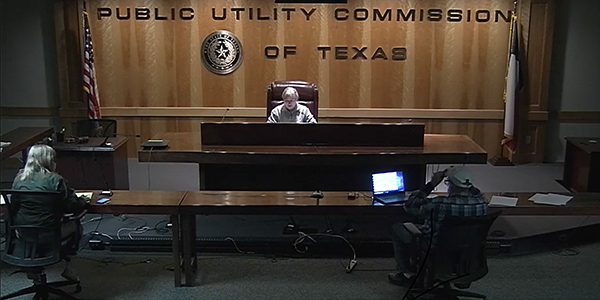In a twist of irony, Texas Public Utility Commission Chair DeAnn Walker found herself sitting in a chilly, darkened hearing room Sunday as she opened the commission’s second emergency open meeting of the weekend.
The state’s facilities group had turned down all the heating and nearly all the lights — except for safety lighting — in government buildings following last week’s power outages, Walker explained.
The PUC then set about its business, issuing a set of orders intended to protect Texas electricity customers and prevent possible disconnections for non-payment on Monday. The directives immediately suspended disconnections until further notice and extended a COVID-19 measure that requires retail electric providers (REPs) to offer deferred payment plans upon request.
The orders only apply to customers of investor-owned utilities under the PUC’s jurisdiction: American Electric Power Texas, CenterPoint Energy, Oncor and Texas-New Mexico Power.

PUC Chair DeAnn Walker convenes the open meeting Sunday with only safety lighting. | PUCT
The commissioners also urged REPs to delay invoicing for residential and small commercial customers. The IOUs rely primarily on automated meters that, in the case of a long-term outage, estimate meter reads based on historical usage.
“We may end up doing this every day,” Walker warned her fellow commissioners. “Every day, a new rock may be turned over that requires us to take action.”
On Friday evening during a hastily called meeting, the PUC waived deadlines surrounding its provider-of-last-resort (POLR) program, where REPs volunteer to accept customers from other providers exiting ERCOT’s competitive market. These “volunteer” REPs are required to charge a competitive rate, rather than the higher POLR rate.
The move was driven by concern that some of the more than 100 REPs in the market may go under after wholesale prices reached $9,000/MWh during the cold snap and stayed there for much of the time.
“I’m happy these customers will have a place to go,” Commissioner Arthur D’Andrea said. “I don’t want any of them to get on a bad POLR plan. They shouldn’t have to deal with that now.”
Vistra’s TXU Energy and NRG Energy’s Reliant Energy, which together account for more than 70% of the retail market, are likely to benefit from the changes.
Horror stories abound of four-figure bills hitting customers who signed up with REPs that pass on wholesale real-time prices. Griddy grabbed most of the headlines by serving one customer a $16,752 bill.
The company’s CEO, Michael Fallquist, said Griddy was designed for an energy market that “allows consumers the ability to plan their usage based on the highs and lows of wholesale energy and shift their usage to the cheapest time periods.”

Griddy’s CEO shared a message sent to customers alerting them to high rates. | Griddy
Indeed, Griddy did warn its 29,000 customers as the winter storm approached to consider switching to other REPs.
For its part, TXU Energy assured its residential customers that they would not see any “near-term impact” because of the winter weather event, though some might experience above-normal bills because of higher usage.
“The headline-grabbing sky-high bills are related to wholesale plans offered by some providers; TXU Energy does not put its customers at risk by offering these plans,” TXU President Scott Hudson said in a statement.
On Saturday, Texas Gov. Greg Abbott convened a bipartisan virtual meeting with 11 state legislators to begin discussions on how to insulate customers from electricity plans linked to wholesale prices.
“It is unacceptable for Texans who suffered through days in the freezing cold without electricity or heat to now be hit with skyrocketing energy costs,” Abbott said before the meeting.
“Our absolute top priority as a commission and a state is protecting electricity customers from the devastating effects of a storm that already affected their delivery of power,” Walker said.
ERCOT, MPs Hit with Lawsuits
The first lawsuits have begun to roll in, targeting ERCOT and market participants for the non-rotating outages that left residents without power for at least 80 hours at a time.
In Houston, a trial lawyer filed a $100 million lawsuit against the ISO and Entergy Texas over the hypothermia death of an 11-year-old boy. Another lawsuit filed in Houston seeks $10 million from the grid operator and CenterPoint Energy for gross negligence. A third lawsuit filed in Corpus Christi asserts the grid operator and AEP Texas are responsible for property damage and business interruptions.
“We haven’t yet reviewed the lawsuits and will respond accordingly once we do. Our thoughts are with all Texans who have and are suffering due to this past week,” ERCOT said in a statement.
The legal efforts face long odds. ERCOT, a nonprofit government agency, enjoys sovereign immunity. The ISO has said it needs immunity from lawsuits because generators’ transaction fees fund the entity.
However, the Texas Supreme Court is expected to rule on a case later this year involving independent generator Panda Power and ERCOT that could eliminate that immunity.




